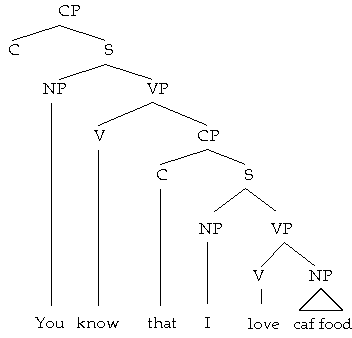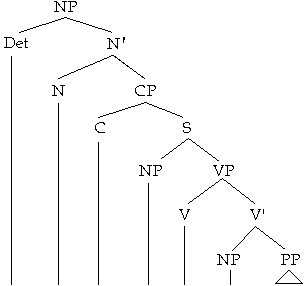| Linguistics 110 Linguistic Analysis: Sentences & Dialects |
| Lecture Number Five |
| Clauses in Clauses in . . . |
- What Complementizer Phrases are for
As you recall from the video, language consists of a finite number of words and a finite number of rules but generates an infinite number of sentences. It can do this because it is possible to embed one sentence (clause) inside another, another inside that one, and so on. Embedded phrases are complements, just like NP or PP complements, except they are united by the complementizer phrase, [CP S], and may be introduced by a complementizer (subordinate conjunction or relative pronoun).
Type of Complement PP Complement Clausal Complement Noun complement a course of study a course (that) I took last year Verb complement cut into the boiled eel. I know (that) you took it. Adjective complements green with envy so hard (that) you couldn't cut it - Complementary Clauses
Complements (spelled with an "e"!) are phrases which are the most closely related to the head of a phrase. Usually, they must be adjacent to the head and nothing may be inserted between the complement and the head. Here is a clausal complement of a VP from the previous lecture.
CP = Complement Phrase C = "complementizer" NP = "noun phrase" N = "noun" VP = "verb phrase" V = "verb" AP = "adjective phrase" A = "adjective" The complementizer that may often be omitted:
You know ___ I love caf food. I told him ___ I had a Beemer. He thought ___ the lashes were real. This is the result of the fact that it is a grammatical morpheme rather than a lexeme; grammatical morphemes often may be omitted when their function can be deduced from the context.
- Relative Clauses
NP complement clauses are known as relative clauses. They differ from VP complements in that the complementizer serves a function in the clause. That is why old fogies like Professor Lemelin says things like I know the man whom you saw e. The complementizer has to be in the accusative case, because its logical (i.e. semantic) POSITION (e below) it the position of the direct object. The direct object of a clause is marked by the accusative case.
- Contemporary linguistics express these relationships in terms of movement, as though the complementizer was actually moved from the direct object position. To a certain extent, however, you should consider this is just a theoretical metaphor for expressing this relationship—linguistist are in disagreement as to the structures of sentences in our heads.


Since every NP can have this structure, it is easy to see how the NP the cat could also contain a complement clause which contains another NP with a complement clause that has an NP in it with a complement clause in it with a complement clause in it . . . get the point? (By the way, that italicized e will be explained in the next lecture. In the meantime, see if you can figure out why it is necessary.)
- Contemporary linguistics express these relationships in terms of movement, as though the complementizer was actually moved from the direct object position. To a certain extent, however, you should consider this is just a theoretical metaphor for expressing this relationship—linguistist are in disagreement as to the structures of sentences in our heads.
- Complementary Clauses
- Conclusion
Complementizer clauses are the means by which clauses are nested inside each other, allowing infinitely long sentences. Complementizers are conjunctions; however, relative and interrogative pronouns may be raised to complementizer position in order to form relative clauses and questions. Nothing may be moved anywhere in a sentence except to complementizer position.
| Now Try a Few Yourself |
| Sylvester forgot that he took the kids. |
| Luella found that her mother was right. |
| Joe thought that Bill shot the armadillo. |
| Fred thought Audrey loved his father. |
| Leslie worried that Fred was thinking. |
| Sam knew what Leslie was thinking. |
| Lee said what he thought. |
| Ursula knew who Phil gave the nod to. |
| Lance suspected what Rosy was driving at. |
| Buffy gasped at what Stu was stewing over. |